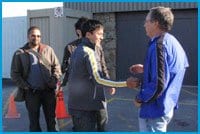Canada’s immigration system has once again rejected Alvaro Orozco. The Nicaraguan-born refugee claimant, originally denied status last October because an Immigration and Refugee Board (IRB) member didn’t believe that he is gay, was issued a negative decision on Sep 14 in connection with his second pre-removal risk assessment (PRRA). A deportation date has been set for Thu, Oct 4.
“The fight’s not over yet,” says Orozco’s lawyer, El-Farouk Khaki, noting that a request has been made for a minister’s permit which would allow Orozco to stay in Canada permanently. Orozco also has an application pending on the basis of humanitarian and compassionate grounds.
But Khaki admits he is surprised by the decision. “They have really dug their heels in instead of saying, ‘Something went wrong and let’s fix it.'”
The result, prepared by PRRA officer J Woodworth and dated Aug 15, concludes that “I find that there is not more than a mere possibility that the applicant would face persecution should he be returned to Nicaragua.”
Khaki says some information contained in Orozco’s second PRRA was not taken into account, including an Amnesty International report from 2006 titled “Lesbian, Gay, Bisexual and Transgender People at Risk in Nicaragua.”
“The officer cites cruising grounds in Managua as evidence of a vibrant and thriving community,” says Khaki. “Amnesty International reports that people are getting killed and shot in those areas but that is not taken into account because they’ve refused to consider [the report].”
The Amnesty International report was not considered in the most recent PRRA because it had already been published at the time of his original PRRA, but wasn’t included in the application made by Orozco’s previous lawyer.
“They rejected the Amnesty International report because it’s not new evidence,” says Khaki. “It wasn’t disclosed by the previous counsel but Alvaro should not be penalized for that. They go through this whole rigmarole about how he’s not at risk while evidence that shows how he is at risk is rejected.”
Also rejected were Spanish translations of English articles that appeared in the Nicaraguan press because they were submitted in Spanish.
“I guess they wanted us to translate it back rather than say it’s the same article,” says Khaki.
The articles effectively outed Orozco in Nicaragua, which Khaki says has exacerbated his risks were he to be returned. The practice and promotion of homosexuality have been illegal in Nicaragua since 1992.
The decision also gave only “slight weight” to letters from friends and community members vouching for Orozco’s homosexuality on the basis that “the information contained within them is from hearsay.”
While Khaki says he thinks it’s fair for the IRB to ask claimants to prove they belong to the category under which they’re seeking protection, there has to be a reasonable means of proving it.
“There’s no scientific or medical test [to prove you’re gay]. Not everyone has a partner or spouse,” says Khaki.
Khaki believes the failure of the PRRA decision to consider the evidence in good faith may be grounds for a judicial review. But with Oct 4 looming it’s unclear whether a judicial review, which could then lead to a stay of the deportation order, will happen in time to prevent Orozco’s removal.
Orozco, 22, came to Canada in 2005 by way of the US, which means that he would be deported back to the US.
“If they send me to the US I would go to a detention centre,” says Orozco. “I was in the US for five years and I was illegal so if I go back I maybe can face jail there.”
Orozco has been offered the chance to return directly to Nicaragua before the Oct 4 date, but Khaki says he’s hoping it doesn’t come to that.
“As far as direct flight back to Nicaragua,” says Khaki, “he bypasses potential detention in the US, but, hey, back to Nicaragua where he’s been outed in the media and homosexuality is illegal. It’s a rock and a hard place. Neither option is good really. Even though we’re talking about it we’re hoping we don’t have to explore any of those options because we’re hoping something is going to happen politically or through the judicial process.”

 Why you can trust Xtra
Why you can trust Xtra


